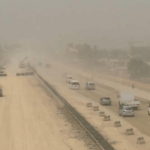
Fellow Ghanaians,
Travel the Ofankor–Nsawam stretch today, and you will understand what true national neglect feels like. What was once a proud artery linking communities and commerce has been reduced to an eyesore of failed promises, shifting timelines, endless diversions, cratered lanes, and dust storms that bury entire communities.
The contractor has torn up the road in the name of reconstruction, yet instead of sequencing the work in ways that keep the road usable, entire stretches have been left unmotorable, abandoned to rain and mud. With every downpour, traffic builds for hours; cars overheat, engines knock, and commuters lose productive hours that no one will ever pay back. The road has become not only a construction site, but a graveyard for shock absorbers, tyres, and patience.
And this is not an isolated case. Go to the Kasoa–Winneba junction construction, another lifeline of movement and trade. The contractor has peeled off the entire bitumen surface, a surface that, while not perfect, was in reasonable shape, and now in its place lies a dusty battlefield of gravel and broken asphalt. The work is meant to expand the road, but common sense demands that if the road is still in active use, one lane is left functional while the other is built. That is how it is done in countries where human suffering is not treated as collateral damage.
But here, in Ghana, we prefer to destroy the whole stretch at once, leave citizens at the mercy of chaos, and call it progress.
What exactly do our engineers write into these contracts? What does the Ministry of Roads and Highways demand of these contractors? Why do they not insist that every reconstruction project must include workable timelines, phased implementation, dust control, proper diversions, and guarantees of motorability for road users while the work is ongoing? Instead, we watch as contractors create disaster zones, move at their own pace, shift timelines with impunity, and leave communities to choke in dust and wallow in mud. It is as if the people who live along these roads do not matter, as if the cost of lost man-hours, extra fuel, car maintenance, and collapsing small businesses is invisible.
Fellow Ghanaians, we are not asking for miracles. We are asking for standards. We are asking for the most basic respect for human beings. In countries with even half of our resources, contractors do not bulldoze the entire road at once; they phase it. They complete one side while keeping the other motorable. They water dusty lanes regularly to reduce pollution. They build proper diversions that may inconvenience, yes, but do not cripple. Here, we are treated as guinea pigs, made to pay twice — once through our taxes and again through destroyed cars and health bills — all because the state has no will to hold contractors accountable.
The Ofankor–Nsawam road is more than asphalt; it is the lifeline of tens of thousands who commute daily from the Eastern Region and the northern parts of Accra. Traders carrying goods, workers rushing to jobs, students on their way to school, families visiting loved ones — all are condemned to waste hours each day in choking traffic because someone signed a contract that does not prioritise their dignity. And when the rains come, the disaster doubles. Water mixes with gravel and dust to create a sludge that traps vehicles, worsens traffic, and makes even short journeys unbearable.
What kind of governance is this, Fellow Ghanaians, where communities are allowed to suffer for years on end while contractors give excuse after excuse and shift deadlines like the hands of a broken clock? What kind of leadership allows a contractor to dig up an entire stretch, disappear for months, and then return with another shifting promise? What kind of respect for citizens is this, when families breathe dust daily, when shopkeepers wipe layers of dirt from their goods every hour, when taxis and trotro drivers spend half their earnings at the mechanic?
This is not development. This is punishment. And it must end.
We must begin to demand contracts that are not written only to enrich contractors, but to protect citizens. We must insist that every road project include clear standards for dust suppression, phased construction, motorable diversions, and strict penalties for missed deadlines. We must demand that contractors be held to account publicly, not only in the quiet offices of bureaucrats who are too quick to extend deadlines and too slow to defend the people.
Fellow Ghanaians, the truth is simple: Ghana deserves better roads, but even more importantly, Ghana deserves better road construction practices. If we cannot build without destroying, if we cannot expand without punishing, if we cannot pave without choking, then we have lost the meaning of progress. A road should connect, not torment. A contract should deliver, not excuse. And a state that fails to demand better from contractors is a state that has forgotten its duty to its people.
And let us talk about the human cost. Every additional hour spent in traffic on that Ofankor–Nsawam stretch is a child arriving late to school, a trader losing the morning market rush, a worker arriving late to his job and risking dismissal. The economy bleeds silently through wasted time, wasted fuel, and wasted energy. Mechanics are smiling, yes, but only because shock absorbers, suspensions, and tyres are collapsing at a rate never seen before. Families that could have spent their meagre resources on food and education are now diverting them to endless vehicle repairs caused not by accident, but by the incompetence of contractors.
Imagine the shopkeeper in Amasaman who sweeps her shelves three times a day because the dust from the road coats every tin and every bottle. Imagine the trotro driver who spends more on spare parts than he earns in profit. Imagine the asthmatic child who coughs endlessly because dust suppression is not part of the contractor’s concern. These are not statistics. These are real lives, diminished daily by a system that refuses to put people first.
And while we struggle here, Fellow Ghanaians, let us lift our eyes abroad for just a moment. In Kenya, when a major road expansion is launched, diversions are properly paved and signposted, and timelines are communicated clearly to the public. In South Africa, contractors know that missing deadlines attracts stiff financial penalties, and they build in phases to avoid crippling communities. In Europe, you can drive through construction zones where contractors work night shifts, leaving at least one lane open, and spraying water to keep dust down. These are not miracles. These are standards. They show respect for citizens. And until Ghana demands the same, we will remain stuck in mud, literally and metaphorically.
Fellow Ghanaians, road projects are meant to symbolise progress, not punishment. When citizens begin to dread construction more than they dread potholes, something has gone terribly wrong. Roads are supposed to bring us together, to connect cities, to reduce travel time, to boost trade. Instead, ours have become corridors of frustration, killing productivity, killing dignity, and in some cases even killing lives when accidents occur in these chaotic zones.
The state cannot continue to look away. Contracts must be rewritten with the citizen at the centre. Contractors must be supervised with rigour, not pampered with endless extensions. Engineers who sign off on poor plans must be held accountable. Ministers who fail to enforce standards must answer to Parliament and the people. We cannot continue to pour billions of cedis into projects that produce nothing but dust, mud, and excuses.
Fellow Ghanaians, our roads are not charity. They are our right. And if the state and its contractors cannot deliver them with respect, then they are failing the very essence of governance. Ghana deserves better.
Good morning.




